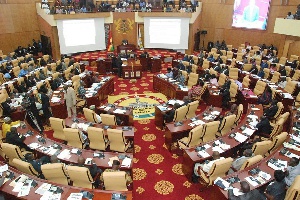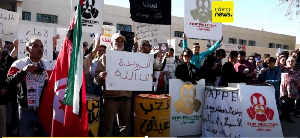The Ghana Centre for Democratic Development (CDD-Ghana) has disclosed that “in 2016, a parliamentary candidate spent as much as $85,000 on average to contest his/her party’s primaries and the parliamentary elections in Ghana, and the most common source of revenue was personal income”.
CDD-Ghana also said the way resources are mobilised by political parties in the country tends to undercut the party’s role in consolidating democracy and delivering development.
In a bulletin, the Centre summarises its research on political party financing in Ghana and its implications for tackling corruption.
The Bulletin also lists a number of ways in which the problem can be tackled.
Below is the full bulletin:
The issue of the linkages between the way parties finance campaigns and operations in Ghana and inability of governing parties to tackle corruption has been a recurring debate since the country was ushered into the Fourth Republic as a multi-party democracy. The debate was recently triggered by Mr. Elvis Afriyie Ankrah, a former Minister of Youth and Sports and an executive member of the National Democratic Congress (NDC) in a rare public confession that the failure of successive governments to effectively fight corruption is due to the existence of political party financiers, who seek to recoup financial investments made in political parties during the election campaign.
Did you know that in 2016, a parliamentary candidate spent as much as $85,000 on average to contest his/her party’s primaries and the parliamentary elections in Ghana and the most common source of revenue was personal income - one that may have implications for personal debt amongst politicians and consequentially corruption?
In a 2009 publication, Prof. E. Kofi Gyimah-Boadi, immediate past Executive Director of CDD-Ghana suggested that direct state funding of political parties, especially funding in cash, must be considered and adopted only after we have exhausted the largely private funding options.
In a national representative survey conducted in 2004, the following observations were made by respondents.
the majority (71%) of respondents identified with political parties, but only a limited number (26%) were card-bearing members of parties.
Eight out of every 10 respondents (80%) believed strongly that there is corruption in political parties.
Respondents cited ‘unfair business’ (42%), and kickbacks (40%) as the greatest manifestations of political corruption.
A slight majority (53%) supported state funding while a significant minority (43%) were opposed to the idea.
The majority (62%) said parties should be allowed to receive contributions from foreign sources.
RECOMMENDATIONS
Lowering the cost of election campaigns
EC, IPAC, and stakeholders should work together to amend PNDC Law 284 to set a six-month period for campaigning during each year of presidential and general elections to minimize cost, check abuse of incumbency and regulate campaign financing.
EC, IPAC and other major stakeholders should work towards lowering cost including placing a ceiling on campaign expenditure.
EC should establish an enforcement unit, which should include a legal advisory support, to enforce laws regarding the conditions for maintaining a registered party and accounting for political party campaign finances.
The EC should work on standardizing its schedule of fees for nomination and accreditation. The Commission should set fees to basically cover the administrative cost for services provided. (also allows for transparency, the justification for fees and generate IGF).
State Funding of Parties (How it can be done)
Any cash support for political parties must be limited to “matching funds.” Thus, political parties must be required to raise (and show proof that they have raised) a certain amount of money from their membership, before they may even be considered for state funding.
Political parties must satisfy all their constitutional and statutory obligations before they qualify for matching funds (meaning they must publish their audited accounts promptly; show the sources of their funds to establish compliance with the law against obtaining funding from non-citizens).
Restrict the use of public matching funds to specific capacity-building activities like policy research and development as opposed to paying emoluments to party executives and “volunteers” to ensure parties do not become unofficial employment agencies for their so-called foot soldiers.
Other determining factors include the number of seats a particular political party has in parliament, the total vote a party obtained in the last general election, the number of functioning regional party offices, and the number of years a particular political party has been in existence.
National Dialogue on the Cost of Politics
Initiation of a national dialogue among political parties, electoral institutions, and civil society to deliberate on the impact of money on politics and the expectations citizens and politicians have in terms of its regulation.
General News of Tuesday, 23 October 2018
Source: classfmonline.com













